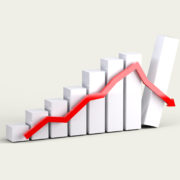I “heard” the market is going to crash…
As originally appeared in The Jerusalem Post on December 30, 2021.
“When making decisions about people, stop confusing experience with evidence. Just as owning a car doesn’t make you an expert on engines, having a brain doesn’t mean you understand psychology.” Adam Grant
This is a big birthday week in our family. First, my father will be celebrating his 92nd birthday, and the following day my dear wife turns, umm, 29 again.
If I know what’s good for me I will leave it at that. I want to wish them both a year of health and happiness and much nachat from the entire family. Daddy, you actually are an expert on cars and engines. It’s great having you in Israel and hopefully, we will get you over for dinner more often which means dessert, maybe we can even find a Sufganiya for you!
To Yael, it’s great being married to you, and may we continue to strengthen our relationship over the next 91 years!
As we age we gather more life experience. We should use that experience to help us make both more informed and more intelligent decisions. When investors forget the past and keep on making bad decisions that drives me crazy.
As often happens at the end of the year, I get a few calls and emails saying that it’s clear that the stock market will drop significantly in the upcoming year and that maybe they should sell all their holdings. Sometimes I even get the “I heard the market is about to drop”. That one makes me laugh. I usually ask, “Um, who did you hear that from??” The answer is inevitably that they heard from a co-worker or a family member. Of course, THEY know exactly when the market will drop because they have the secret sauce. Not even the most successful investors can make such predictions, but their 3rd cousin, Shmulik from Bat Yam knows.
Global inflation is surging. Interest rates will be moving higher. There are all kinds of supply chain issues. New Covid variants mean potential lockdowns and closures. Chinese growth has stalled. Maybe you should sell everything and move into cash. After all, you can always buy stocks back when the market goes up.
Panic doesn’t pay
A few years ago Mitch Tuchman on Marketwatch wrote, “Without delving too deeply into the track record of economists (or anyone else) in predicting the stock market, it’s worth remembering that the biggest risk people run when investing is not in taking too little action, but too much.” He adds, “The short answer is this: The little guy gets creamed. The typical retail investor saw a return of 2.5%, just a hair above inflation, over the past two decades. The S&P 500 returned 9.9% annualized.”
I have heard stories of terrified investors selling out their entire portfolio as they are afraid of the market “crashing.” Is that a rational decision? Investors get spoiled when markets continually go up, but a 10-20% drop is relatively common and actually healthy for the stock market’s long-term prospects.
Long-term outlook
Long-term investors shouldn’t get caught up over short-term market gyrations. Markets drop, but after each drop markets recover, sometimes immediately, and sometimes it takes a bit of time, but the recovery happens. Just take a look back at ’08. After the 35% drop, the market proceeded to triple over the next 6-7 years.
Two years ago, when Covid hit, the market also lost a third of its value in 5 weeks, and it took just a few months to make back all the losses. Those investors who wait on the sidelines until they receive some kind of “indicator” that the market is headed higher are inevitably the ones who lose. That “indicator” usually comes after the market has made a huge recovery, and they missed it.
Along those same lines, Tuchman goes on to say, “But another big part of the problem is market timing, that is, reacting to headlines that scream “sell everything.” If you want to hear that, there has been no shortage of market prognosticators making the same warning. In fact, they have been saying it for seven years running, even as the stock market busted to new highs over and over. The history of investing is full of years when absolutely horrific, frightening events took place, wars, scandals, social unrest, and yet stocks put on steady gains. Taking the current headlines and making them into a reason to sell is a tactical mistake.”
Scared?
It’s certainly not fun watching your net worth drop significantly. I am not downplaying investor fear. But it goes without saying that money invested for growth should be money that you can afford to lose, because in the short-term no one knows if the market will go up or down. If you can’t stand the volatility of the markets’ ups and downs then change your asset allocation. Take your foot off the gas pedal and buy some fixed-income investments to make your portfolio less aggressive. But please do yourself a favor and don’t panic, sell everything and just wait on the sidelines.
The information contained in this article reflects the opinion of the author and not necessarily the opinion of Portfolio Resources Group, Inc. or its affiliates.
Aaron Katsman is the author of Retirement GPS: How to Navigate Your Way to A Secure Financial Future with Global Investing (McGraw-Hill), and is a licensed financial professional both in the United States and Israel, and helps people who open investment accounts in the United States. Securities are offered through Portfolio Resources Group, Inc. (www.prginc.net). Member FINRA, SIPC, MSRB, SIFMA, FSI. For more information, call (02) 624-0995 visit www.aaronkatsman.com or email aaron@lighthousecapital.co.il.








